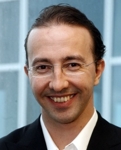
Le Web 10 host Loic Le Meur just finished his on-stage interview with Alexander Tamas, Partner at one of the most watched technology investment firms on the planet, DST / Mail.ru Group.
That’s quite a presence you have: Groupon, Zynga, Facebook and … Twitter?
Not Twitter (smiles).
What is DST?
The firm originated in Russia, grew out of social networking company called Mail.ru, and at some point we started making international investments. Facebook was our first one.
How big is your stake in Facebook now?
It’s hard to say, we’ve made some straightforward investments and then we bought as many shares from early employees and investors as possible. We’ve definitely invested more than $500 million in total though.
So Facebook was your first investment – how did that come about?
Well, we owned and ran a social network in Russia, but the dynamics there were different, we were actually ahead of most social sites. Every single one of our countries became really big. So, we knew there was money in it, and we realized quickly that it was only a matter of time for Facebook to become really large worldwide.
Did you lead the Mail.ru Group IPO as well?
Yes, that was last month.
Is it the biggest tech IPO in Europe to date?
In the past few years, yes. The initial market valuation was about $6 billion, we’re now at roughly $8 billion.
So when’s the Facebook IPO planned?
I don’t have any comments on that (smiles).
Do you sit on the Facebook board?
No we actually don’t, but we obviously have good relationships with management and other board members. our perspective is that it’s entirely possible to be a major investor in a company without being on the board, as long as you have an open dialogue with the people in charge.
You got in late, what was Facebook’s valuation at the time?
We got in at a $6.5 billion valuation. It’s difficult to say what the valuation is now – although I can tell you the secondary market ones are based on limited information and generally not super accurate.
We haven’t purchased Facebook shares in quite some time though.
The Zynga investment came after Facebook?
Yes.
Why haven’t they been acquired yet?
If you’re a founder of company like Zynga, with fast growth and massive revenues, it only makes you wealthy on paper, right. So you used to have two choices: sell or take it public. Now, companies can get liquidity early on, so it takes the pressure of.
We invested $150 million in Zynga, but we didn’t disclose at what valuation.
So Groupon was almost sold …
I can’t comment on the rumors, but I can tell you that they’re going for it. They realize they have something special and there’s a lot of potential for Groupon to become a generation-defining company. They’re shooting for the stars.
By the way, I’m always amazed when people discuss valuations of private companies without actually knowing the financials. The truth is most people can’t say whether investments come cheap or expensive, as commentators. It all depends on how you measure growth, and most people tend to think linearly.
When we invested in Groupon, they sold 4 million groupons, a month later it was 25% more. The potential was obvious. They’ll hit 20 million groupons sold next week.
How does a startup get an investment deal out of DST? Is Twitter big enough, as an example?
It’s definitely an interesting company, but there are more. What we look at is that you have to be on a path to become a clear leader in your segment, companies that could theoretically go public today. We want to know all companies, but we focus our investments on those with long-term sustainability.
You know, we’re not an early-stage investor. We’re really small, with no people on the ground. So we can’t really help companies when they’re just getting started, apart from writing a check, and that’s not what we want. There are many more capable firms for that.
So startups should give you a call when they hit a $1 billion valuation?
Not really, we’ll also talk to you if you’re clearly on a path to becoming a $1 billion company down the line.
What about Foursquare?
There are lots of opportunities for them, they’re seeing good growth, so it could become a really interesting company for sure.
You’re (sort of) a European fund – why don’t you invest more here?
Groupon, Zynga and Facebook really just happened to be US companies, we look all over the world for companies. We tick boxes, and we can do that anywhere.
Many of the startups in Europe for some reason want to sell out early. That’s not what we’re looking for. There aren’t enough role models here, so less confidence.
Do you look at Asia, more specifically India, China and Japan?
It’s definitely a geography we’re looking at. We know a lot of the companies there already.
What’s your advice for young entrepreneurs?
Not many people have the opportunity to really change the world. If you have an urge to build something that could, don’t focus on the money, but the legacy you’ll leave behind.
It’s a once-in-a-lifetime opportunity to build a generation-defining company, so I applaud people for shooting for the stars. It’s a much more rewarding thing than doing it for the money.
I mean, look at Le Web, it’s not just about the money right, it’s also the community, helping out startups throughout Europe.
Loic: yes, we actually got a few offers, but we’re not looking at that right now.